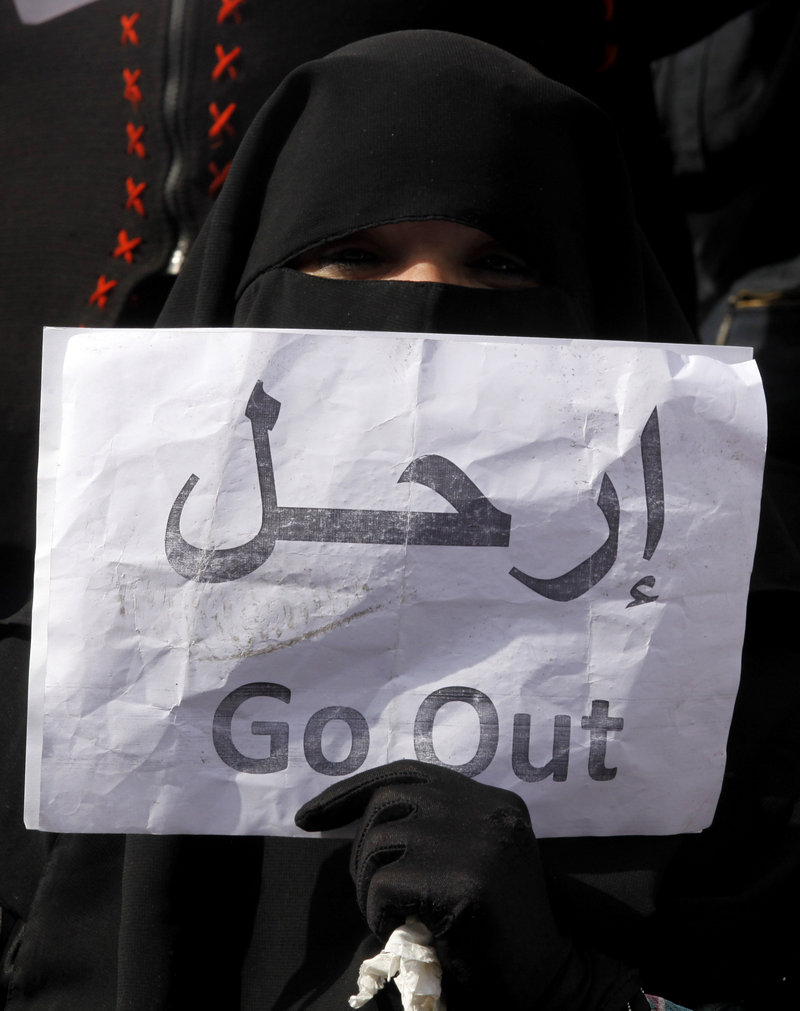CAIRO – Egypt’s wave of protests has brought the fundamentalist Muslim Brotherhood within sight of a long-sought dream: Not outright power, as some fear, but a recognized and open role in the politics of this top U.S. ally.
Vice President Omar Suleiman on Thursday said he had invited the Brotherhood into negotiations over Egypt’s future and the transition to democracy — a stunning concession to a group that the regime considers its worst enemy and has cracked down on ferociously in past years.
The Brotherhood has rushed to take a stronger role in the unprecedented protests that erupted 10 days ago, led by more secular young activists demanding the ouster of President Hosni Mubarak. The Brotherhood’s strength was on display in the pitched battles Wednesday and Thursday against government supporters who attacked the protesters’ camp in Cairo’s central Tahrir Square.
Brothers — distinguishable by their close-cropped beards — dominated the front lines, often lining up to pray for “victory or martyrdom” before throwing themselves into the fray, hurling stones, sticks and firebombs at the attackers while shouting “God is great.”
The potential of the Brotherhood gaining greater power has clearly weighed on the United States as it presses Mubarak to bow out. U.S. officials have said they want the transition to democracy to be stable to prevent any group from imposing its ideology.
Israel has been more alarmist in fears of an Islamic militant takeover, and Prime Minister Benjamin Netanyahu has warned that any government that emerges from Egypt’s turmoil must preserve the 1979 peace deal between the two countries.
And Egypt’s government has been happy to fuel those worries, long warning the United States and Egyptians themselves that the Brotherhood aims to take over the country and lead it into Islamic radicalism. Mubarak, in an interview with ABC News, blamed the Brotherhood for the past two days of clashes.
The Brotherhood, founded in 1928 and outlawed in 1954, renounced violence decades ago and its strain of conservative Islam falls far short of the radicalism of Afghanistan’s Taliban or even the ultrapuritanism that reigns in U.S. ally Saudi Arabia.
Though some in al-Qaida have Brotherhood roots, the terror group and other jihadists despise the movement for participating in elections.
But the Brotherhood’s professed ultimate goal is to turn Egypt into an Islamic state, likely to pressure women to cover up in public, ban alcohol and undoubtedly strain ties with Israel.
Brotherhood leaders insist they are not seeking a leadership role in the protests. That reflects a wariness of breaking its fragile alliance with secular activists and prompting a backlash against it.
“We are very clear: We are out there, but only so far as what fits and meets the requirements of the nation,” said Mohammed Mursi, a senior Brotherhood leader. “We are not wavering, but we are not being reckless, either.”
The Brotherhood’s presence among protesters has visibly grown. Their supporters — men in beards and women in veils cloaking their entire faces except their eyes — were checking the IDs of people coming into the square and searching them.
Diaa Rashwan, a prominent Egyptian expert on Islamic groups, believes that the Brotherhood may be moving into high gear to take full advantage of the situation created by the protests.
“They are a highly organized group and have been wanting to gain power for a long time,” he said. “At this point in time, they have gone on a high alert and are mobilizing all their assets. They would be fools not to.”
The disparate young leftists and secularists who launched the protests and still make up a majority on the streets view the Brotherhood with suspicion. But they also insist that its power and the popular support it would have in a democratic system are exaggerated.
“The Brotherhood looks big in a nation like ours where politics are basically a one-party system,” said Fathi Farid, a 23-year-old blogger. “But once we have a nation where everyone is free and the law is above everyone, it will be just one of the players.”
The Brotherhood maintains a deliberate ambivalence over its intentions.
It says, for example, that it opposes Egypt’s peace treaty with Israel and endorses the right to armed resistance against the Jewish nation, but says that it will not actively seek to rescind the agreement because it was adopted by the parliament of the time.
It continues to maintain that its objective is to create a purist Islamic state in Egypt, but says it will not force women to wear the Islamic veil in public. Its stand on whether Egypt’s Christian minority should have equal rights with Muslims and women’s role in society are less clear.
Mursi himself maintained that the Brotherhood was unlikely to win a majority in a free and fair election in Egypt.
But this, critics contend, is a Brotherhood tactic to play down its abilities and conceal its real intentions. The Brotherhood has long been seen as the best organized opposition movement in Egypt, despite the ban against it, with a disciplined political network across the country. Much of the Brotherhood’s popular support comes from its network of social services, which in some cases offer the public a more efficient service than the government’s.
Send questions/comments to the editors.



Success. Please wait for the page to reload. If the page does not reload within 5 seconds, please refresh the page.
Enter your email and password to access comments.
Hi, to comment on stories you must . This profile is in addition to your subscription and website login.
Already have a commenting profile? .
Invalid username/password.
Please check your email to confirm and complete your registration.
Only subscribers are eligible to post comments. Please subscribe or login first for digital access. Here’s why.
Use the form below to reset your password. When you've submitted your account email, we will send an email with a reset code.